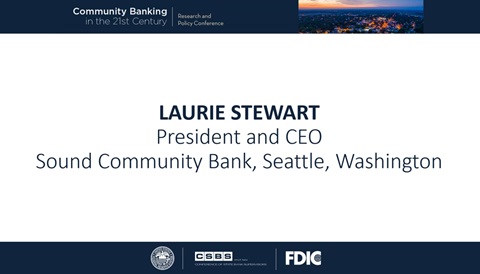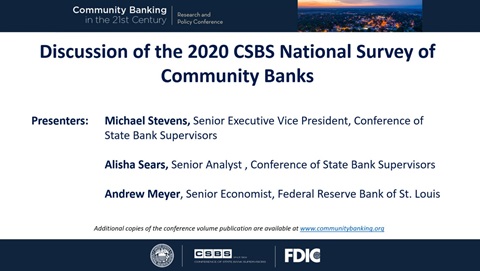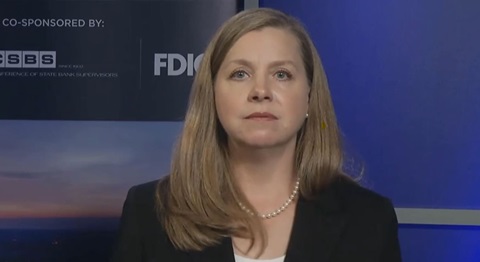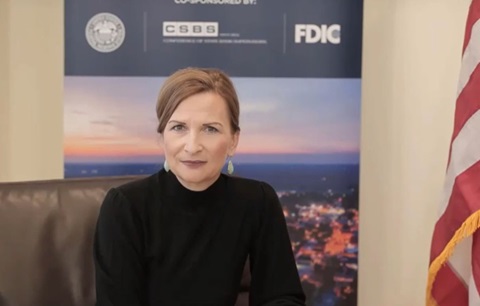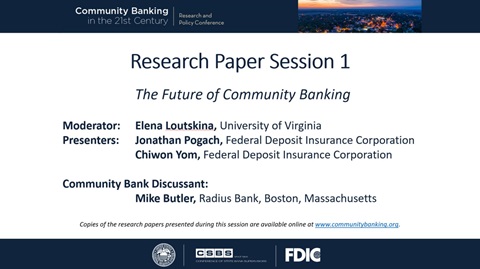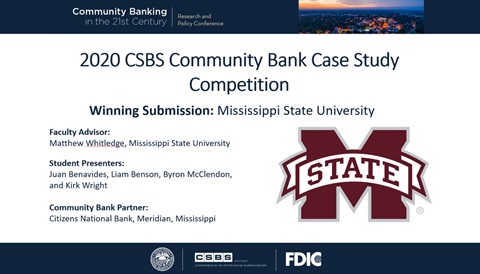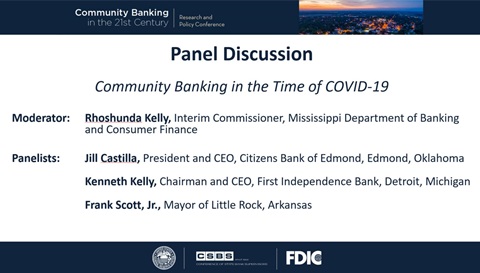
2020 Community Banking in the 21st Century Research and Policy Conference
Taking place virtually on September 30 and October 1, the research conference will bring together community bankers, academics, policymakers and bank regulators to discuss the latest research on community banking.
Community Banking in the 21st Century
The conference presents an innovative approach to the study of community banks. Academics explore issues raised by the industry in a neutral, empirical manner and present their findings at the conference. Community bankers contribute to an annual national survey prior to the conference and then participate directly in the conference by serving as keynote speakers and panelists, and by providing feedback to the research presented. For more information, please contact conference@communitybanking.org.
Conference Agenda
2020 Conference Hosted Virtually via WebEx | Livestream via communitybanking.org | All Times Reflected in ET
September 30 - October 1, 2020
Download as PDF
- Wednesday, September 30
-
Welcome
-
Presentation of Findings from the 2020 CSBS National Survey of Community Banks
Presentation of the 2020 CSBS National Survey of Community Banks -
Keynote Remarks
-
Break
-
Concurrent Research Paper Session 1
The Future of Community Banking Moderator: Elena Loutskina
Moderator: Elena Loutskina
Professor of Business Administration, Peter M. Grant II Bicentennial Foundation Chair in Business Administration, Darden School of Business, University of Virginia
Shared Destinies? Small Banks and Small Business ConsolidationJonathan Pogach, Federal Deposit Insurance Corp.- FDICBank EntrepreneursChiwon Yom, Federal Deposit Insurance Corp.- FDICModerator Elena Loutkina and Discussant Mike Butler ResponseThe Future of Community Banking: Q&A -
Concurrent Research Paper Session 2
Community Development and Support Moderator: Lamont Black
Moderator: Lamont Black
Associate Professor of Finance, Driehaus College of Business, DePaul University Chicago, Illinois
 Community Bank Discussant: Alden McDonald, Jr.
Community Bank Discussant: Alden McDonald, Jr.
President and CEO, Liberty Bank and Trust Company, New Orleans, Louisiana
“Revitalize or Stabilize”: Does Community Development Financing Work?Daniel Ringo, Board of Governors of the Federal Reserve SystemThe Propagation of Local Credit Shocks: Evidence from Hurricane KatrinaSamir Elsadek Mahmoudi, Georgia State UniversityModerator Lamont Black and Discussant Alden McDonald ResponseCommunity Development and Support: Q&A -
Break
-
Keynote Conversation
 Moderator: Diane Ellis
Moderator: Diane Ellis
Director, Division of Insurance and Research, Federal Deposit Insurance Corp.- FDIC
-
Wrap-up
-
Optional Post-Plenary Meetings for Day 1 Sessions
President Bullard and Carl White Post-Plenary Session - Thursday, October 1
-
Opening Keynote
 Introduction: Roberta Hollinshead
Introduction: Roberta Hollinshead
Director of Banks , Washington State Department of Financial Institutions
-
2020 CSBS Winning Case Study Presentation:
Mississippi State University, Starkville, Mississippi Introduction: Kevin Hagler
Introduction: Kevin Hagler
Commissioner, Georgia Department of Banking and Finance; 2020 Chair, Conference of State Bank Supervisors - CSBS
Student TeamJuan Benavides, Liam Benson, Byron McClendon, Jake Mlsna and Kirk Wright
Faculty AdvisorMatthew Whitledge, Assistant Clinical Professor of Finance, Mississippi State University
-
Break
-
Concurrent Research Paper Session 3
Local Lending and Credit Access Moderator: Amiyatosh Purnanandam
Moderator: Amiyatosh Purnanandam
Michael Stark Professor of Finance, Ross School of Business, University of Michigan
 Community Bank Discussant: Vernon Hirata
Community Bank Discussant: Vernon Hirata
Vice Chairman and Co-chief Operating Officer, Territorial Savings Bank, Honolulu, Hawaii
Big Banks, Household Credit Access and Intergenerational Economic MobilityErik Mayer, Southern Methodist UniversityGovernment-Sponsored Wholesale Funding and the Industrial Organization of Bank LendingDayin Zhang, University of Wisconsin-MadisonModerator Amiyatosh Purnanandam and Discussant Vernon Hirata ResponseLocal Lending and Credit Access: Q&A -
Concurrent Research Paper Session 4
Moral Hazard Issues in Regulation and Oversight Moderator: Kathryn Judge
Moderator: Kathryn Judge
Harvey J. Goldschmid Professor of Law , Columbia Law School, Columbia University
How Important Is Moral Hazard For Distressed Banks?Ajay Palvia, Federal Deposit Insurance Corp.- FDICInsurance Pricing, Distortions, and Moral Hazard. Quasi-experimental Evidence from Deposit InsuranceGeorge Shoukry, Federal Deposit Insurance Corp.- FDICModerator Lamont Black and Discussant Alden McDonald, Jr. ResponseCommunity Development and Support: Q&A -
Break
-
Panel Discussion: Community Banking in the Time of COVID-19
Panelists -
Optional Post-Plenary Meetings for Day 2 Sessions
Research Papers, Authors and Key Findings
Concurrent Research Paper Session 1
The Future of Community Banking
Shared Destinies? Small Banks and Small Business Consolidation
Author: Jonathan Pogach, Federal Deposit Insurance Corp.- FDIC
Key Findings:
The study investigates whether changes in the composition of businesses affects the composition of the banking industry. It finds that small-firm employment is positively associated with small bank deposits, income, and small business lending but not associated with large-bank balance sheets and income. The authors link their results to the propensity of small banks to be acquired. The findings are consistent with a view that, in the absence of small-business financial service demand, a large-bank business model based on economies of scale may be more profitable than a small-bank business model based on comparative advantages in relationship lending. While many existing policies seek to support small businesses through the support of small banks, the authors’ results suggest supporting small businesses could be a potential mechanism for supporting small banks.
Bank Entrepreneurs
Author: Chiwon Yom, Federal Deposit Insurance Corp.- FDIC
Key Findings: The study analyzes the characteristics of entrepreneurs who participated in the opening of 185 de novo banks from 2000 to 2008, and how these characteristics influenced subsequent bank performance. These bank entrepreneurs were driven by local opportunities, and also had significant banking and managerial experience, particularly at small banks, unique local knowledge and the networks necessary to raise local funding. Prior employment experiences had a causal effect on bank investment strategies and performance. For instance, prior experience in the real estate industry predicted a higher rate of commercial real estate lending, especially for construction and development loans. These results provide insights that can guide policies that support entrepreneurship and financial stability.
Moderator Elena Loutkina and Discussant Mike Butler Response
The Future of Community Banking: Q&A
Concurrent Research Paper Session 2
Community Development and Support
“Revitalize or Stabilize”: Does Community Development Financing Work?
Author: Daniel Ringo, Board of Governors of the Federal Reserve System
Key Findings:
The study uses data obtained from bank performance evaluations under the Community Reinvestment Act to estimate how increased community development lending and investment affects local economic activity. It finds that lending increases wages and employment (at a rate of one job per $56,000 in loans), but does not increase the supply of affordable housing or the growth of house prices. Evidence on the effect of investments is inconclusive. These findings are important insofar as banks in the United States originate $100 billion in community development loans annually and hold similar amounts of community development investments on their balance sheets.
The Propagation of Local Credit Shocks: Evidence from Hurricane Katrina
Author: Samir Elsadek Mahmoudi, Georgia State University
Key Findings:
In the aftermath of Hurricane Katrina, banks operating in multiple markets diverted financial resources to areas that were damaged, where demand was high for housing and mortgages, from areas that were undamaged. A resulting credit tightening in the undamaged areas reduced housing prices and slowed construction activity. Community banks, being unexposed to damaged areas, partially insulated their local markets from these spillovers.
Moderator Lamont Black and Discussant Alden McDonald Response
Community Development and Support: Q&A
Concurrent Research Paper Session 3
Local Lending and Credit Access
Big Banks, Household Credit Access and Intergenerational Economic Mobility
Author: Erik Mayer, Southern Methodist University
Key Findings: The study examines access to credit for low-income borrowers provided by local banks. It finds that small banks approve a higher percentage of mortgage applications than large banks and that mortgage approval rates decrease with increased distances to branch locations. These results indicate that “soft” information is important when lending to low-income households and that smaller banks incorporate more of this information into their lending decisions. The author also finds that intergenerational economic mobility is lower in areas where banks are larger, raising the question of whether consolidation in the banking industry contributes to economic inequality.
Government-Sponsored Wholesale Funding and the Industrial Organization of Bank Lending
Author: Dayin Zhang, University of Wisconsin-Madison
Key Findings: The study shows that a bank’s access to low-cost funding through the Federal Home Loan Bank (FHLB) is associated with an 18-basis-point reduction in its mortgage rates and a 16% increase in its mortgage lending. This effect, moreover, is 25% stronger for small community banks. The authors also find that intensified local competition pushes other lenders to lower their mortgage rates as well, and overall market lending grows. The authors conclude that the FHLB increases annual mortgage lending in the U.S. by $50 billion and saves borrowers $4.7 billion in interest payments every year, through changing the competitive landscape of the mortgage market.
Moderator Amiyatosh Purnanandam and Discussant Vernon Hirata Response
Local Lending and Credit Access: Q&A
Concurrent Research Paper Session 4
Moral Hazard Issues in Regulation and Oversight
How Important Is Moral Hazard For Distressed Banks?
Author: Ajay Palvia, Federal Deposit Insurance Corp.- FDIC
Key Findings: This study examines incentives for distressed banks to increase risk-taking as a consequence of deposit insurance and other related elements of the bank safety net. The moral hazard incentives of the bank safety net predict that distressed banks take on more risk and higher leverage. The authors investigate two distinct periods, the first being 1985-1994 and the other being 2005-2014. They both encompassed a financial crisis and were subject to different regulatory regimes. Rather than expand leverage, the authors found that distressed banks took actions to reduce leverage by shrinking assets, closing branches, cutting employees, reducing deposits, reducing deposit rates, adding equity capital and cutting dividends. They also reduced risk, as evident in lower non-performing loans and earnings volatility. The authors conclude that role of moral hazard is limited and that the deleveraging of banks is independent of regulatory regime.
Insurance Pricing, Distortions, and Moral Hazard. Quasi- experimental Evidence from Deposit Insurance
Author: George Shoukry, Federal Deposit Insurance Corp.- FDIC
Key Findings:
The author finds evidence that differentials in insurance premiums under risk-based deposit insurance provide banks with incentives to curb excessive risk-taking, which points to the effectiveness of risk-based pricing. However, the evidence also identifies distortionary effects as institutions paying higher premiums shifted their funding sources away from deposits and engaged in an intricate form of regulatory arbitrage to lower their total burden of deposit insurance premiums. This erodes the effectiveness of risk-based pricing and highlights the importance of strong regulatory controls when risk-based insurance pricing is used.
Moderator Lamont Black and Discussant Alden McDonald, Jr. Response
Community Development and Support: Q&A
Speakers and Panelists
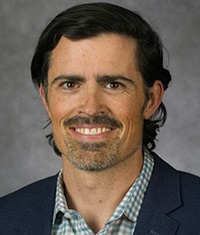 Lamont Black is an associate professor of finance in the Driehaus College of Business at DePaul University, Chicago, Illinois. Black is also the academic director of DePaul’s John L. Keeley Center for Financial Services. Prior to joining the faculty of DePaul, Black was an economist at the Federal Reserve Board of Governors in Washington, D.C. His main research interests are in the areas of banking, corporate finance and macroeconomics. His research has been published in numerous journals, including the Review of Financial Studies; the Journal of Money, Credit and Banking; and the Journal of Banking and Finance. Black teaches money, banking, and capital markets to undergraduate and graduate students. He received a Ph.D. in Finance, as well as his Ph.D. in Economics, from the Kelley School of Business at Indiana University. He received his bachelor's degree in Modern Thought and Literature from Stanford University.
Lamont Black is an associate professor of finance in the Driehaus College of Business at DePaul University, Chicago, Illinois. Black is also the academic director of DePaul’s John L. Keeley Center for Financial Services. Prior to joining the faculty of DePaul, Black was an economist at the Federal Reserve Board of Governors in Washington, D.C. His main research interests are in the areas of banking, corporate finance and macroeconomics. His research has been published in numerous journals, including the Review of Financial Studies; the Journal of Money, Credit and Banking; and the Journal of Banking and Finance. Black teaches money, banking, and capital markets to undergraduate and graduate students. He received a Ph.D. in Finance, as well as his Ph.D. in Economics, from the Kelley School of Business at Indiana University. He received his bachelor's degree in Modern Thought and Literature from Stanford University.

Michelle W. Bowman took office as the Vice Chair for Supervision of the Board of Governors of the Federal Reserve System on June 9, 2025, for a four-year term. Ms. Bowman has served as a member of the Board of Governors of the Federal Reserve System since taking office on November 26, 2018, to fill an unexpired term ending January 31, 2020. She was reappointed to the Board on January 23, 2020, and sworn in on January 30, 2020, for a term ending January 31, 2034.
Prior to her appointment to the Board, Ms. Bowman served as the state bank commissioner of Kansas from January 2017 to November 2018. She also served as vice president of Farmers & Drovers Bank in Kansas from 2010 to 2017. In addition to her experience in the banking industry, Ms. Bowman worked in Washington, D.C. for Senator Bob Dole of Kansas from 1995 to 1996 and served as a counsel to the U.S. House Committee on Transportation and Infrastructure and the Committee on Government Reform and Oversight between 1997 and 2002. In 2002, Ms. Bowman became director of congressional and intergovernmental affairs at the Federal Emergency Management Agency. From 2003 to 2004, she served as Deputy Assistant Secretary and policy advisor to Homeland Security Secretary Tom Ridge.
Following her time in Washington, D.C., Ms. Bowman led a government and public affairs consultancy based in London before returning to Kansas in 2010. Ms. Bowman received a BS in advertising and journalism from the University of Kansas and a JD from the Washburn University School of Law. She is a member of the New York Bar. Ms. Bowman is married with two children.

James Bullard is the president and CEO of the Federal Reserve Bank of St. Louis. In that role, he is a participant on the Federal Reserve’s Federal Open Market Committee (FOMC), which meets regularly to set the direction of U.S. monetary policy. He also oversees the Federal Reserve’s Eighth District, including activities at the St. Louis headquarters and its branches in Little Rock, Arkansas, Louisville, Kentucky, and Memphis, Tennessee. A noted economist and policymaker, Bullard makes Fed transparency and dialogue a priority on the international and national stage as well as on Main Street. He serves on the board of directors of the St. Louis Regional Chamber and the board of directors of Concordance Academy of Leadership, and he is a past board chair of the United Way U.S.A. Bullard is co-editor of the Journal of Economic Dynamics and Control, and a member of the Central Bank Research Association’s senior council. He is an honorary professor of economics at Washington University in St. Louis, where he also sits on the advisory council of the economics department and the advisory board of the Center for Dynamic Economics. A native of Forest Lake, Minnesota, Bullard received his doctorate in economics from Indiana University in Bloomington.
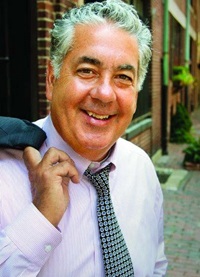
Michael A. Butler is the president and CEO of Radius Bank, Boston, Massachusetts. Since joining Radius Bank in March 2008, Mr. Butler has transformed the Bank into an innovative leader in the financial services industry, one focused on delivering superior customer service and leading-edge technology to its clients. Under his direction, the Bank has diversified their product offerings beyond consumer and business deposit accounts, by acquiring the equipment financing division of NewStar Financial, expanding the Bank’s for Government Guaranteed Lending footprint nationwide, and developing a Banking-as-a-Service (Baas) platform that allows fintechs to leverage Radius’ expertise and technology to power personal and business banking solutions. During his tenure, Radius has been named Best Online Bank by Bankrate, Best Checking Account by Nerdwallet, Best Business Checking account for Growing Business by Fundera, as well as finalist for best fintech partnership by both Tearsheet and Finovate. Prior to joining the Bank, Mike served as President, National Consumer Finance at KeyCorp in Cleveland, Ohio. He is a graduate of Providence College and the ABA's Stonier Graduate School of Banking. Mike serves as a member of the Financial Services Committee for the Greater Boston Chamber of Commerce, on the Board of Trustees for Thompson Island Outward Bound, and has been active with the Habitat for Humanity program. He was previously recognized as an EY Entrepreneur Of The Year® New England Finalist.

Jill Castilla leads Citizens Bank of Edmond as its president and CEO. Castilla joined Citizens Bank of Edmond in 2009, where she transformed the struggling institution into one of the most innovative community banks in the nation. Most recently, Castilla created patent-pending technology with a full-service electronic banking facility. Her entrepreneurial spirit spills over into her community engagement as the founder of “Heard on Hurd,” a monthly street festival that revitalized downtown Edmond, creating more that $30 million in economic impact and more than $40 million in capital investment. In an effort to propel effectiveness of the U.S. Small Business Administration’s Payroll Protection Program, Castilla partnered with billionaire investor Mark Cuban to create PPP.bank, a free resource for small businesses that was named a Finovate Best Fintech Partnership finalist in 2020. On the national stage, Castilla serves as civilian aide to the Secretary of the Army and on the board of the American Bankers Association, including the audit, venture investment and communications committees. She is a member of the Federal Reserve Bank of Kansas City’s Community Depository Institutions Advisory Council and past Chair of the Community Bankers Association of Oklahoma. Castilla is a six-time recipient of American Banker’s “Most Powerful Women in Banking – Women to Watch” and the team she leads at Citizens Bank of Edmond is a two-time recipient of the “Top Team in Banking.” Prior to her career in community banking, Castilla managed various departments at the Federal Reserve Bank of Kansas City and was an enlisted member in the U.S. Army and Oklahoma Army National Guard. Castilla holds a master’s degree in economics from the University of Oklahoma and a bachelor’s degree in finance from Hawaii Pacific University, where she is a Distinguished Alumna. She is a graduate of the University of Wisconsin's Graduate School of Banking and The Wharton School at the University of Pennsylvania Executive Leadership Program.
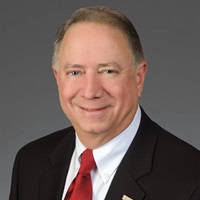
David R. Coxon, Director of Community and Small Business Banking for Georgia Banking Company. Prior to Georgia Banking David was President and CEO of Georgia Primary Bank in Atlanta. Georgia Primary Bank and Georgia Banking Company merged in February of 2025. The combined organizations is 2.6 billion in Assets centered in the greater Atlanta, Georgia market.
A lifelong Georgia banker with over five decades of banking experience. His banking experience spans a wide range of disciplines in commercial and community banking. Over the past thirty years he has held executive management positions with various institutions.David holds a BBA degree in accounting from Columbus State University and a master’s in organizational leadership and management from Mercer University.
From 1997 to 2004 he was an Adjunct Professor with Mercer University.
David is a member of the Georgia Bankers, Community Bankers, and the Risk Management Associations (ProSight). David is a lifetime member of the Risk Management Association having chaired their Community Bank Council and was national chair for the Risk Management Association in 2010/11. He is a past instructor for the Georgia and South Carolina Banking Schools.
He has served on various boards such as America Red Cross, American Heart Association, United Way, Chamber of Commerce, International Association of Administrative Professionals, and the Executive Council for Boy Scout of America.
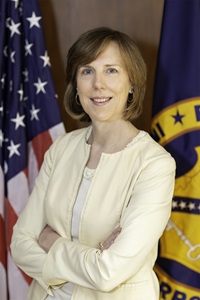
Diane Ellis is the director of the Division of Insurance and Research at the Federal Deposit Insurance Corporation (FDIC). The division is responsible for maintaining the adequacy of the Deposit Insurance Fund and an effective and fair risk-based premium system. It also leads the FDIC’s efforts to assess economic and financial sector risks to the banking industry; directs policy-oriented research, both in-house and through the FDIC’s Center for Financial Research; conducts analysis for FDIC rulemakings; and manages the collection and publication of bank financial information and statistics, including the Quarterly Banking Profile. The division disseminates research and analysis through a variety of channels, including published and online reports, as well as conferences and roundtables. Ellis started her FDIC career as a bank examiner in the Orange County, Calif., field office, where she examined numerous troubled banks and thrifts during a severe recession. She then joined the Division of Insurance in Washington, D.C. where she analyzed emerging risks to the banking and thrift industries, with particular emphasis on the consumer sector and credit conditions. Ellis has also served as Deputy to the Vice Chairman, Special Assistant to the Chief Operating Officer, Associate Director for Financial Risk Management, and Deputy Director for Financial Risk Management and Research. She currently serves on the executive council of the International Association of Deposit Insurers. She holds a Bachelor of Business Administration in Finance from Texas Christian University, Ft. Worth, Texas, and is a Chartered Financial Analyst.
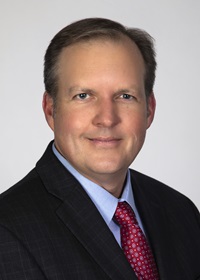
Kevin Hagler was appointed Commissioner of the Georgia Department of Banking and Finance effective July 1, 2013. As Commissioner, Kevin has regulatory oversight of 129 banks, 48 credit unions, and over 18,000 mortgage and money service business entities.
Prior to his appointment as Commissioner, Kevin served as Deputy Commissioner for Supervision since August 1, 2008, where he was directly responsible for supervision of depository financial institutions (state-chartered banks and trust companies; state-chartered credit unions; and, bank holding companies and foreign banking organizations conducting business in Georgia).
Kevin began his career with the Department as an Assistant Financial Examiner in 1997. He progressed through the examiner ranks and became a Supervisory Examiner in 2002 in District 1. In 2003, Kevin was appointed to the position of District Director in District 1, where he assumed field regulatory and supervisory responsibilities for the financial institutions in the District.
Prior to joining the Department, Kevin started his career by working for Altus Bank before taking a position with The Bank of Mobile. In 1994, he moved to Atlanta to work for Trust Company Bank (SunTrust Bank) in the Factoring Division, and later worked in Retail Banking.
Kevin currently serves as Chairman of the Conference of State Bank Supervisors. He also serves on the Regulatory Committee, and the Fintech Steering Group. He is a graduate of Auburn University with a degree in Finance and is a Certified Examination Manager.
 Vernon Hirata is the vice chairman and co-chief operating officer of Territorial Savings Bank, Honolulu, Hawaii. He also serves as general counsel and corporate secretary of the bank, which was originally chartered in 1921. Hirata, who has been with Territorial since 1986, received his Bachelor of Arts from Coe College in Cedar Rapids, Iowa and his Juris Doctor from Cornell University, Ithaca, New York. He is a member of the American Bar Association, the Hawaii State Bar Association and is currently the president of the Hawaii Society of Corporate Secretaries. With approximately $2 billion in assets, Territorial Savings Bank has 29 branches that serve the islands of Oahu, Maui, Kauai and Hawaii. It became a publicly traded company in July of 2009.
Vernon Hirata is the vice chairman and co-chief operating officer of Territorial Savings Bank, Honolulu, Hawaii. He also serves as general counsel and corporate secretary of the bank, which was originally chartered in 1921. Hirata, who has been with Territorial since 1986, received his Bachelor of Arts from Coe College in Cedar Rapids, Iowa and his Juris Doctor from Cornell University, Ithaca, New York. He is a member of the American Bar Association, the Hawaii State Bar Association and is currently the president of the Hawaii Society of Corporate Secretaries. With approximately $2 billion in assets, Territorial Savings Bank has 29 branches that serve the islands of Oahu, Maui, Kauai and Hawaii. It became a publicly traded company in July of 2009.
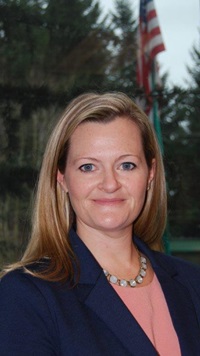 Roberta Hollinshead is the director of banks for the Washington State Department of Financial Institutions. Hollinshead is responsible for chartering and supervising the activities of Washington state-chartered banks and trust companies. She works closely with stakeholders to promote sound economic development in the banking industry and to support a prosperous economy in Washington. Hollinshead is an active member of the Conference of State Bank Supervisors (CSBS), serving on the board of directors and as the District V chair. She also serves on the board of trustees for the CSBS Education Foundation. Hollinshead also serves on the board of the Pacific Coast Bankers School, LLC. She received her Bachelor of Arts in business administration with a finance concentration from the University of Washington. In addition, Hollinshead has an MBA from Seattle University and a certificate from the Graduate School of Banking at Colorado.
Roberta Hollinshead is the director of banks for the Washington State Department of Financial Institutions. Hollinshead is responsible for chartering and supervising the activities of Washington state-chartered banks and trust companies. She works closely with stakeholders to promote sound economic development in the banking industry and to support a prosperous economy in Washington. Hollinshead is an active member of the Conference of State Bank Supervisors (CSBS), serving on the board of directors and as the District V chair. She also serves on the board of trustees for the CSBS Education Foundation. Hollinshead also serves on the board of the Pacific Coast Bankers School, LLC. She received her Bachelor of Arts in business administration with a finance concentration from the University of Washington. In addition, Hollinshead has an MBA from Seattle University and a certificate from the Graduate School of Banking at Colorado.
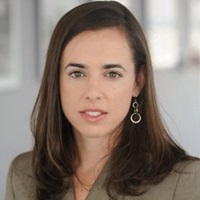 Kathryn Judge is the Harvey J. Goldschmid Professor of Law at Columbia Law School. Judge is an expert on financial markets, financial regulation and regulatory architecture and serves as an editor of the Journal of Financial Regulation. She is also a research member of the Brussells, Belgium-based European Corporate Governance Institute, and a member of the Financial Stability Task Force sponsored by the Hutchins Center on Fiscal & Monetary Policy at the Brookings Institution and the Initiative for Global Markets at the University of Chicago Booth School of Business. Judge has written numerous articles on the complexity of modern financial markets, how that complexity increases fragility and reduces accountability, and how financial regulation can better address these challenges. These articles have been published in leading journals, including the Harvard Law Review, the Stanford Law Review, The University of Chicago Law Review, the Virginia Law Review and the Columbia Law Review. Prior to joining Columbia Law School, Judge clerked for Judge Richard Posner of the 7th Circuit Court of Appeals and Justice Stephen Breyer of the Supreme Court.
Kathryn Judge is the Harvey J. Goldschmid Professor of Law at Columbia Law School. Judge is an expert on financial markets, financial regulation and regulatory architecture and serves as an editor of the Journal of Financial Regulation. She is also a research member of the Brussells, Belgium-based European Corporate Governance Institute, and a member of the Financial Stability Task Force sponsored by the Hutchins Center on Fiscal & Monetary Policy at the Brookings Institution and the Initiative for Global Markets at the University of Chicago Booth School of Business. Judge has written numerous articles on the complexity of modern financial markets, how that complexity increases fragility and reduces accountability, and how financial regulation can better address these challenges. These articles have been published in leading journals, including the Harvard Law Review, the Stanford Law Review, The University of Chicago Law Review, the Virginia Law Review and the Columbia Law Review. Prior to joining Columbia Law School, Judge clerked for Judge Richard Posner of the 7th Circuit Court of Appeals and Justice Stephen Breyer of the Supreme Court.
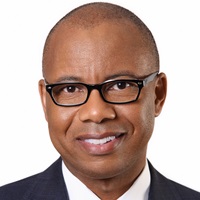
Kenneth Kelly serves as Chairman and CEO of First Independence Bank, a minority depository institution, based in Detroit, Michigan. He is a respected leader in the banking community, currently serving as Chairman of the National Bankers Association. In 2018, he was named to the Federal Reserve Bank’s Seventh District Community Depository Institutions Advisory Council (CDIAC). Kenneth was also selected to become a member of the Federal Deposit Insurance Corporation Chairman’s Advisory Committee on Community Banking which is charged with providing advice and recommendations to the FDIC on a broad range of community banking policy and regulatory matters. In October 2020, he is expected to be seated on the American Bankers Association Board of Directors. Kenneth has testified as an expert witness before the U.S. Congressional House Financial Services subcommittee on consumer protection and financial institutions and has provided input to the full committee of the House Financial Services during its COVID19 listening session. Also, Kenneth provided input and advice to the Secretary of Treasury and White House Staff during COVID19 on the state of minority banks.
Kenneth’s leadership in various organizations has culminated in him being selected as the chairperson of the Auburn University Engineering Alumni Council. In this role, Kenneth works with a successful group of alumni including many CEO’s to assist the dean of the college with research and development, fundraising, academic achievement and overall guidance to the college to become the best student-centered program in America. In 2019, the dedication of the new Brown Kopel Engineering Student Achievement Center included the naming of the Kenneth Kelly Engineering Academic Excellence Program Reception Area.
Prior to banking, Kenneth enjoyed a 27 year career as an electric utility business leader in numerous roles within Southern Company. His last role entailed negotiating acquisitions of large renewable solar projects valued at $3.4 billion in partnership value. In 2018, Kenneth was inducted as the 137th Distinguished Auburn Engineer. On February 22nd, 2020 he was inducted into the State of Alabama Engineering Hall of Fame.
Kenneth grew up in Eufaula, Alabama and received an electrical engineering degree from Auburn University and completed the executive MBA program at the University of Alabama.
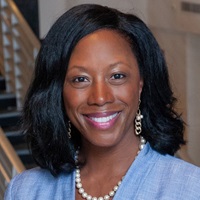
Rhoshunda Kelly was appointed by Governor Tate Reeves to serve as the Commissioner of the Department of Banking and Consumer Finance on March 22, 2021. Kelly has over 20 years of experience as a regulator, beginning her career with the Department as a bank examiner trainee in 2001. She was a field examiner from 2001 to 2011 and became a review examiner in 2012. Kelly was promoted to the Director of Bank Supervision in 2013 and appointed Deputy Commissioner in 2014. As Deputy Commissioner, Kelly managed the banking, mortgage, consumer finance, administration, legal and information technology divisions. She also ensured effective coordination between the state and federal regulators and fostered engagement with regulated industries.
As Commissioner, Kelly ensures effective agency operations and oversees $154 billion in state-chartered banking assets. She also ensures the licensure and supervision of over 8,000 consumer finance and mortgage licensees, which represent 11 financial industries.
Kelly received her undergraduate degree in business with a concentration in Banking and Finance from Mississippi State University. She is a graduate of the Graduate School of Banking at Louisiana State University where she is a past instructor. Kelly is also an honor graduate of the American Bankers Association Graduate Trust School. She serves as a member of the Mississippi Certified Public Manager Advisory Board. Kelly is Vice-Chair of Mississippi State University Finance and Economics Advisory Board and was named a 2019 Leader in Finance by Mississippi Business Journal.
Kelly is active in the Conference of State Bank Supervisors (CSBS) and was recently elected as the Chair Elect of the Executive Committee and Board of Directors.

Elena Loutskina is a professor of business administration and the Peter M. Grant II Bicentennial Foundation Chair in Business Administration at the Darden School of Business, University of Virginia, Charlottesville, Virginia (UVA). Her research is centered on financial intermediation. She originally started her work by exploring the impact of securitization on management of financial and nonfinancial companies. Over time, her research interest expanded to exploring more dimensions of commercial banks strategic management. Her papers have addressed topics in consumer finance, mortgage markets, small business lending and regulation of financial intermediaries. In 2019, Loutskina received the UVA Alumni Association Distinguished Professor Award. Her work has been published in the Journal of Finance, Review of Financial Studies and the Journal of Financial Economics. She is currently the co-editor of the Journal of Financial Intermediation. She has served as a visiting scholar with the Federal Reserve Bank of Cleveland and as fellow of the Wharton Financial Institutions Center at the University of Pennsylvania. Loutskina received her Ph.D. in finance from Boston College, Chestnut Hill, Massachusetts. She received her Bachelor of Science in mathematical economics and her Master of Science in applied math in economics from Belarus State University, Minsk, Belarus.
 Samir Elsadek Mahmoudi is a doctoral candidate in economics at Georgia State University, Atlanta, Georgia. He specializes in consumer finance, mortgage markets and public economics. His research focuses on the transmission of shocks through banks' internal networks and the response of the banking system to natural disasters. He is also a National Bureau of Economic Research pre-doctoral fellow on the economics of an aging workforce. His research on the economics of aging estimates the effect of late-career unemployment shocks on pension savings. Prior to his Ph.D. studies, Mahmoudi was a diplomat representing the government of Egypt in trade and finance negotiations.
Samir Elsadek Mahmoudi is a doctoral candidate in economics at Georgia State University, Atlanta, Georgia. He specializes in consumer finance, mortgage markets and public economics. His research focuses on the transmission of shocks through banks' internal networks and the response of the banking system to natural disasters. He is also a National Bureau of Economic Research pre-doctoral fellow on the economics of an aging workforce. His research on the economics of aging estimates the effect of late-career unemployment shocks on pension savings. Prior to his Ph.D. studies, Mahmoudi was a diplomat representing the government of Egypt in trade and finance negotiations.
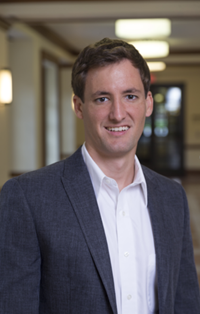 Erik J. Mayer is an assistant professor of finance at the Cox School of Business at Southern Methodist University, Dallas, Texas. His research interests include financial institutions, household finance and empirical corporate finance. His recent work studies racial disparities in households’ access to credit and the role of credit access in intergenerational economic mobility. Mayer received his doctorate in finance from Rice University in 2018, where he also earned his bachelor’s degree in mathematical economic analysis in 2012.
Erik J. Mayer is an assistant professor of finance at the Cox School of Business at Southern Methodist University, Dallas, Texas. His research interests include financial institutions, household finance and empirical corporate finance. His recent work studies racial disparities in households’ access to credit and the role of credit access in intergenerational economic mobility. Mayer received his doctorate in finance from Rice University in 2018, where he also earned his bachelor’s degree in mathematical economic analysis in 2012.
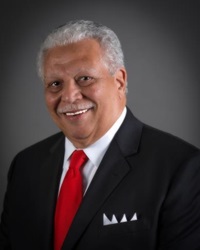
Alden McDonald, Jr. is president and CEO of Liberty Bank and Trust Company, one of the top African American-owned financial institutions in the United States. McDonald oversees an expanding network of financial institutions serving urban communities and provides leadership in community development to a diverse customer base throughout America. He is recognized as a passionate advocate and dynamic catalyst in providing avenues for economic growth, home ownership, wealth building and leadership development in the African American community. McDonald has gained a national reputation as a creative, insightful, yet practical problem solver who has developed mortgage and banking products that enhance the opportunities for the financially underserved, as well as the upwardly mobile populations of America's cities. A graduate of the Louisiana State University’s School of Banking and Columbia University's Commercial Banking Management Program, McDonald has celebrated more than 50 years in banking. Under his stewardship, Liberty has grown from an initial asset base of $2 million to more than $700 million in assets. Over the past 10 years, Liberty has closed over $1 billion in loans. Liberty now operates financial institutions in nine states and 11 major urban areas.
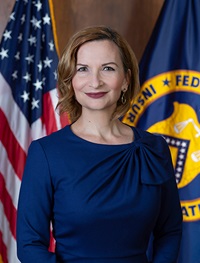 Jelena McWilliams was sworn in as the 21st chairman of the Federal Deposit Insurance Corp. (FDIC) on June 5, 2018. She serves a six-year term on the FDIC Board of Directors, and is designated as chairman for a term of five years. Prior to joining the FDIC, McWilliams was executive vice president, chief legal officer and corporate secretary for Fifth Third Bank in Cincinnati, Ohio. Prior to joining Fifth Third, she worked in the United States Senate for six years, most recently as chief counsel and deputy staff director with the Senate Committee on Banking, Housing and Urban Affairs, and as assistant chief counsel with the Senate Small Business and Entrepreneurship committee. From 2007 to 2010, McWilliams served as an attorney with the Federal Reserve Board of Governors. Before entering public service, she practiced corporate and securities law at Morrison & Foerster LLP in Palo Alto, California, and Hogan & Hartson LLP (now Hogan Lovells LLP) in Washington, D.C. She graduated with highest honors from the University of California at Berkeley with a Bachelor of Science in political science, and earned her Juris Doctor from the UC Berkeley School of Law.
Jelena McWilliams was sworn in as the 21st chairman of the Federal Deposit Insurance Corp. (FDIC) on June 5, 2018. She serves a six-year term on the FDIC Board of Directors, and is designated as chairman for a term of five years. Prior to joining the FDIC, McWilliams was executive vice president, chief legal officer and corporate secretary for Fifth Third Bank in Cincinnati, Ohio. Prior to joining Fifth Third, she worked in the United States Senate for six years, most recently as chief counsel and deputy staff director with the Senate Committee on Banking, Housing and Urban Affairs, and as assistant chief counsel with the Senate Small Business and Entrepreneurship committee. From 2007 to 2010, McWilliams served as an attorney with the Federal Reserve Board of Governors. Before entering public service, she practiced corporate and securities law at Morrison & Foerster LLP in Palo Alto, California, and Hogan & Hartson LLP (now Hogan Lovells LLP) in Washington, D.C. She graduated with highest honors from the University of California at Berkeley with a Bachelor of Science in political science, and earned her Juris Doctor from the UC Berkeley School of Law.
 Andrew P. Meyer is a senior economist in the Community Bank Research and Outreach office of the Federal Reserve Bank of St. Louis. He received a doctorate in economics from Washington University in St. Louis and has worked at the Federal Reserve since 1994. In addition to his research on community banking issues, Meyer conducts statistical analysis of the downgrade and failure risk of commercial banks. He also serves on a committee to improve the Federal Reserve's off-site bank surveillance program and has taught regularly in examiner training schools.
Andrew P. Meyer is a senior economist in the Community Bank Research and Outreach office of the Federal Reserve Bank of St. Louis. He received a doctorate in economics from Washington University in St. Louis and has worked at the Federal Reserve since 1994. In addition to his research on community banking issues, Meyer conducts statistical analysis of the downgrade and failure risk of commercial banks. He also serves on a committee to improve the Federal Reserve's off-site bank surveillance program and has taught regularly in examiner training schools.
 Ajay A. Palvia is a senior financial economist with the Division of Insurance and Research of the Federal Deposit Insurance Corp (FDIC). His research interests include financial regulation, market discipline and banking. Prior to joining the FDIC, Palvia worked in the Policy Analysis Division within the Economics department of the Office of the Comptroller of the Currency, where he assisted that agency in evaluating impacts of regulatory rules and policies and participated in various internal and interagency working groups. Palvia received his doctorate in economics from Cornell University, his master’s degree in computer science from Penn State University, and his bachelor’s degree in statistics from Boston University.
Ajay A. Palvia is a senior financial economist with the Division of Insurance and Research of the Federal Deposit Insurance Corp (FDIC). His research interests include financial regulation, market discipline and banking. Prior to joining the FDIC, Palvia worked in the Policy Analysis Division within the Economics department of the Office of the Comptroller of the Currency, where he assisted that agency in evaluating impacts of regulatory rules and policies and participated in various internal and interagency working groups. Palvia received his doctorate in economics from Cornell University, his master’s degree in computer science from Penn State University, and his bachelor’s degree in statistics from Boston University.
 Jonathan Pogach is the chief of the financial modeling and research section of the Center for Financial Research Division of Insurance and Research with the Federal Deposit Insurance Corp. His research interests include bank dividend policy, internal capital markets at bank holding companies, bank consolidation and bank technology. His work has been published in economics and finance journals that include the Journal of Economic Behavior & Organization and the Journal of Financial Services Research. In addition, his work has been presented at finance conferences such as the American Finance Association Annual Meeting, the Financial Intermediation Research Society Annual Meeting and the Chicago Financial Institutions Conference. He holds a Ph.D. in economics from the University of Pennsylvania, from which he also obtained his undergraduate degrees.
Jonathan Pogach is the chief of the financial modeling and research section of the Center for Financial Research Division of Insurance and Research with the Federal Deposit Insurance Corp. His research interests include bank dividend policy, internal capital markets at bank holding companies, bank consolidation and bank technology. His work has been published in economics and finance journals that include the Journal of Economic Behavior & Organization and the Journal of Financial Services Research. In addition, his work has been presented at finance conferences such as the American Finance Association Annual Meeting, the Financial Intermediation Research Society Annual Meeting and the Chicago Financial Institutions Conference. He holds a Ph.D. in economics from the University of Pennsylvania, from which he also obtained his undergraduate degrees.
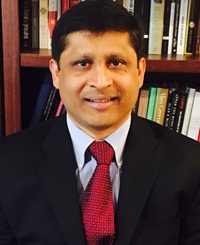
Amiyatosh Purnanandam is the Michael Stark Professor of Finance and the chair of the finance program at the Ross School of Business, University of Michigan, Ann Arbor, Michigan. His research covers a wide range of topics in banking, corporate finance, and credit risk. His recent research work covers topics related to measurement and detection of risk in banks, bank-bailouts, and consumer credit. His research has been published in leading finance and economics journals such as Journal of Financial Economics, Journal of Finance, Review of Financial Studies, Review of Finance, and Journal of Monetary Economics. He currently serves as an Editor of the Review of Finance and has also served on the editorial board of several other academic journals. Purnanandam received his Ph.D. from Cornell University, Ithaca, New York.
 Daniel Ringo is a senior economist in the Research and Statistics Division at the Board of Governors of the Federal Reserve System. His research interests include real estate finance, urban economics and household finance. At the Board, Ringo’s work includes conducting analysis to assist efforts to modernize the Community Reinvestment Act, as well as to monitor financial conditions in mortgage markets. He earned his Ph.D. in economics from the University of Rochester, Rochester, New York, and his bachelor’s degree in economics and history from Tulane University, New Orleans, Louisiana.
Daniel Ringo is a senior economist in the Research and Statistics Division at the Board of Governors of the Federal Reserve System. His research interests include real estate finance, urban economics and household finance. At the Board, Ringo’s work includes conducting analysis to assist efforts to modernize the Community Reinvestment Act, as well as to monitor financial conditions in mortgage markets. He earned his Ph.D. in economics from the University of Rochester, Rochester, New York, and his bachelor’s degree in economics and history from Tulane University, New Orleans, Louisiana.
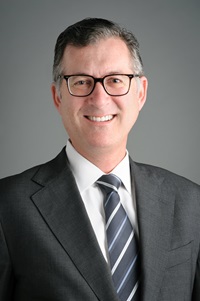
John W. Ryan is the president and CEO of the Conference of State Bank Supervisors, the national association representing state banking supervisors and the leading advocate for advancing the state banking system. Before being named CSBS president and CEO in August 2011, Ryan was CSBS's executive vice president, a position he had held since October 2003. He first joined CSBS in 1997 as an assistant vice president for legislative affairs. Prior to joining CSBS, Ryan worked at Newmyer Associates, a public affairs consulting firm, where he led the company's financial services consulting practice. Previous to his work at Newmyer Associates, Ryan spent four years as a professional staff member to the U.S. House of Representatives Committee on Banking, Finance and Urban Affairs. Ryan received a bachelor's degree in political science and economics from the University of California-Berkeley.
 Frank Scott, Jr. made history on Dec. 4, 2018, when he was elected as the city of Little Rock’s 73rd mayor and first popularly elected African American chief executive. Since that day, Scott has worked to unite diverse neighborhoods into one city and one people to improve the city’s economy and quality of life. Scott began his public service career in the office of Arkansas Governor Mike Beebe, where he served for five years, first as deputy policy director and later as director of intergovernmental affairs. While on Beebe’s staff, Scott continued his education, earning a MBA from the University of Arkansas at Little Rock with a concentration in finance. He had previously earned his undergraduate degree in Business Administration from the Fogelman College of Business at the University of Memphis. Determined to put his finance training to work, Scott accepted a position as a community banker with First Security Bank, giving him insight into the issues facing small businesses across the city. At the same time, he continued to devote a significant amount of time to serving both his city and the state as a member of the Port of Little Rock board of directors and as a member of the Arkansas Highway Commission.
Frank Scott, Jr. made history on Dec. 4, 2018, when he was elected as the city of Little Rock’s 73rd mayor and first popularly elected African American chief executive. Since that day, Scott has worked to unite diverse neighborhoods into one city and one people to improve the city’s economy and quality of life. Scott began his public service career in the office of Arkansas Governor Mike Beebe, where he served for five years, first as deputy policy director and later as director of intergovernmental affairs. While on Beebe’s staff, Scott continued his education, earning a MBA from the University of Arkansas at Little Rock with a concentration in finance. He had previously earned his undergraduate degree in Business Administration from the Fogelman College of Business at the University of Memphis. Determined to put his finance training to work, Scott accepted a position as a community banker with First Security Bank, giving him insight into the issues facing small businesses across the city. At the same time, he continued to devote a significant amount of time to serving both his city and the state as a member of the Port of Little Rock board of directors and as a member of the Arkansas Highway Commission.
Scott is a former member of the Pulaski Technical College Board of Trustees (now UA-PTC) and currently serves on the University of Arkansas-Little Rock’s board of visitors.

Alisha Sears is a senior analyst in the policy development group with the Conference of State Bank Supervisors (CSBS). Sears provides analytical and operational support to the regulatory committee, the legislative committee and the state supervisory processes committee, as well as taskforces, and interagency groups that contribute to the CSBS policy development process. She has also been integral in planning and managing several projects associated with the Community Banking Research Conference. Prior to joining CSBS in the spring of 2018, Sears was with the Financial Industry Regulatory Authority (FINRA). She has also held positions with the Securities and Exchange Commission (SEC), law firms and an investment advisory firm. Sears received her Juris Doctor from the University of Maryland and her undergraduate degree from the University of Michigan. She is a member of the Maryland State Bar Association and the American Bankers Association Banking Law Committee, as well as Women in Housing and Finance.

George Shoukry is a senior financial economist with the Federal Deposit Insurance Corp. (FDIC) Center for Financial Research in the Division of Insurance and Research. He is interested in the design of regulations, including deposit insurance pricing, and in how banks change their behavior in response to regulatory shocks. More broadly, he is interested in empirical and theoretical aspects of design and has done research in the area of mechanism design. In addition, he is interested in the use of machine learning methods in economics, and he has worked on the development of models that use machine learning tools to monitor and forecast banks' health. He joined the FDIC in June 2014 after receiving his Ph.D. and his Master of Science in economics from the University of Texas at Austin. He received his Bachelor of Science in mechanical engineering from West Virginia University, Morgantown, West Virginia, and his Master of Science in mechanical engineering from the Georgia Institute of Technology, Atlanta, Georgia.

Michael Stevens is the senior executive vice president at the Conference of State Bank Supervisors (CSBS). He is responsible for leading the organization's public policy, financial supervision, federal coordination, communications, industry relations and professional development functions. Stevens also serves as the principal deputy to the state banking member of the Financial Stability Oversight Council. Prior to his appointment in September 2011, he served as the senior vice president for regulatory policy, representing the state banking system in the development of policy in the areas of financial stability, prudential supervision and consumer protection. He joined CSBS in 1999 to work in all facets of CSBS's professional development division. Stevens is a frequent instructor and speaker on banking policy, examinations and financial analysis. He serves on the faculty of the Graduate School of Banking at Colorado and at Texas Tech University's School of Banking. He began his regulatory career as a bank examiner for the Iowa Division of Banking, where he served 11 years.
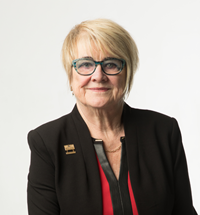
Laura Lee (Laurie) Stewart is the president and CEO of Seattle-based Sound Community Bank, where she has celebrated more than 30 years at the helm. In that time, she led the conversion of the organization from a $38 million credit union to a commercial bank that grew to be more than $718 million in assets. She maintains a long history in community banking and participation in industry affairs. Stewart currently serves as the chair of the American Bankers Association, representing the nation’s $18.6 trillion banking industry and the employment of more than two million workers. She is also holds a position on the board of directors for the Federal Reserve Bank of San Francisco’s Seattle Branch. Previously, Stewart served as chair of the board of directors of the Washington Bankers Association (WBA), where she helped create the WBA’s Executive Development Program. In addition, she was one of 14 bankers selected to serve on the inaugural Federal Deposit Insurance Corp.’s Advisory Board in 2009, and in 2012, she was named to the Community Bank Advisory Council of the Consumer Financial Protection Bureau. In 2019, she was named Community Banker of the Year by American Banker and received an Executive Excellence award from Seattle Business Magazine. American Banker also named her as one of its Most Powerful Women in Banking in 2011, 2015, 2017, 2018, and 2019. Stewart serves as chair of the board of directors for the National Arthritis Foundation and she is a member of the board of directors of various local, community and charitable organizations such as the Woodland Park Zoo, Seattle, Washington.
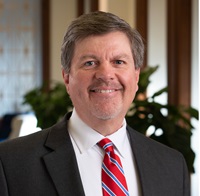
Carl White is the senior vice president of the Supervision, Credit, Community Development and Learning Innovation division at the Federal Reserve Bank of St. Louis. White has more than 35 years of experience in the Supervision Division of the Federal Reserve Bank of St. Louis. He is currently senior vice president of the Supervision, Credit and Learning Innovation Division. He has served in various other roles within Safety and Soundness, beginning his career as an examiner. Mr. White has served as lead instructor and course developer on numerous Fed System training courses, including an international assignment in Brazil. In addition, he served as the central point of contact for the District’s largest state member bank before and during the financial crisis. He and his team were nominated for the District’s President’s Award for Innovation as a result of efforts to implement and enhance off-site loan review and examination processes. Mr. White holds a bachelor’s degree with a major in finance from St. Louis University.

Chiwon Yom is a senior economist at the Center for Financial Research with the Federal Deposit Insurance Corporation. Her research interests include bank performance and risk measurement, new bank formation and entrepreneurship, and relationship lending and credit availability. In addition to research, she has worked on deposit insurance pricing and early warning models, participated in the Basel Committee Research Task Force, and reviewed credit risk, market risk and stress-testing models on bank examinations. She received her doctorate from the University of California at Irvine and her Bachelor of Science from the University of California at Berkeley.
 Dayin Zhang is an assistant professor in the department of real estate and urban land economics, University of Wisconsin-Madison. His research interests include financial intermediation and real estate finance. He earned his Ph.D. in finance and real estate at the Haas School of Business, University of California-Berkeley.
Dayin Zhang is an assistant professor in the department of real estate and urban land economics, University of Wisconsin-Madison. His research interests include financial intermediation and real estate finance. He earned his Ph.D. in finance and real estate at the Haas School of Business, University of California-Berkeley.Video Gallery

